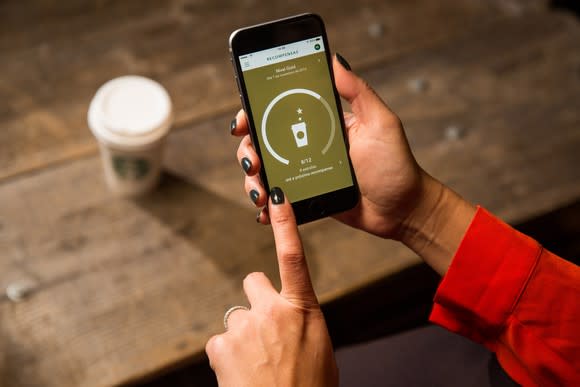Starbucks Management Talks Customer Service, Digital Marketing, and More
Coffee giant Starbucks (NASDAQ: SBUX) recently wrapped up its fiscal 2018 on an upbeat note, posting better-than-expected revenue and earnings per share in its fiscal fourth quarter. The period was fueled by strong comparable store sales momentum, new store openings, and further growth in the company's loyalty program.
To fully appreciate Starbucks' strong performance and management's plans to keep its business going strong, investors should look beyond the company's recent third-quarter earnings report and also consider commentary from management during the company's quarterly conference call.

Image source: Starbucks.
Here are three telling insights from the call.
Starbucks' rebound plan is working
In Starbucks' fourth quarter, everything seemed to go right, as Starbucks CEO Kevin Johnson captured during his opening remarks of the company's fourth-quarter earnings call.
The fourth quarter showed significant improvement from the third quarter in nearly every critical metric and came in ahead of our expectations on comp store sales, revenue, and EPS. While we still have work to do, these results provide encouraging evidence that our plan is working.
This momentum gives more credibility to the company's plans to reinvigorate its business, which include efforts to accelerate growth in the U.S. and China, expand the reach of the Starbucks brand, and focus on increasing shareholder returns by streamlining and simplifying operations.
Putting customers first
Starbucks has always been about more than coffee. The company focuses just as much on the customer experience as it does its products -- and Starbucks is renewing this emphasis by cutting up to 50% of in-store administrative tasks to free up more of employees' time to better serve customers.
Starbucks Chief Operating Officer Rosalind Brewer said the company made progress on this initiative during its fourth quarter:
... with the expectation this could initially unlock up to two to three hours daily for partners to focus on customer connections. We made solid progress against this goal in Q4 redeploying up to 1.5 hours per day of non-customer-facing tasks to customer-facing activity depending on the store.
Building digital relationships
One particularly impressive area of Starbucks' business in Q4 was its growth in digital relationships.
First and foremost, the coffee giant's growth in active reward members grew at an accelerated pace, rising 15% year over year to 15.3 members (members increased 14% in Q3). This occurred during a quarter when Starbucks usually sees a deceleration in this metric's growth rate because of seasonality.
In addition, Starbucks saw more sharp growth in its digital relationships with non-rewards members. These customers, which Starbucks refers to as its digitally registered customers, increased from 6 million in the third quarter of fiscal 2018 to 10 million. This progress showed how the company's recent decision to open its mobile order app to non-reward members is paying off.
Starbucks' marketing chief, Matthew Ryan, commented on these new non-reward member digital relationships, saying this fast-growing base of important customers is creating an opportunity for the company:
I think that we have begun to build an opportunity for us, and we have not yet gotten to where we want to go. So we are just beginning to send offers to this group of people. We have not yet begun to personalize, and that's something we expect to do later this year.
Starbucks' momentum is clear, evident both by key metrics such as the company's 11% year-over-year revenue growth in its third quarter and the company's 3% growth in comparable-store sales, and by management's confidence in its ongoing efforts to revitalize its business.
More From The Motley Fool
Daniel Sparks has no position in any of the stocks mentioned. The Motley Fool owns shares of and recommends Starbucks. The Motley Fool has a disclosure policy.

 Yahoo Finance
Yahoo Finance 